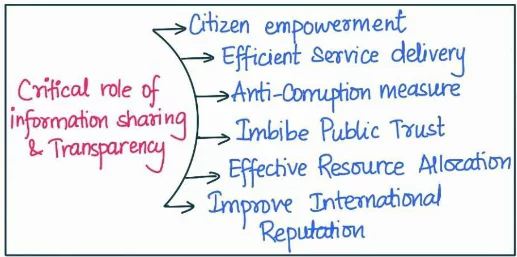Answer:
|
How to approach the question
- Introduction
- Write about information sharing and transparency in governance briefly
- Body
- Write the critical role of information sharing and transparency in national governance.
- Write the critical role of information sharing and transparency in global governance.
- Conclusion
- Give an appropriate conclusion in this regard.
|
Introduction
Information sharing and transparency in governance entail the ethical obligation to openly and responsibly disclose relevant data, decisions, and processes to the public. It promotes accountability, fosters trust, and upholds principles of fairness, integrity, and participation in the administration of public affairs.
Body
Critical role of information sharing and transparency in national governance:

- Citizen empowerment: It provides them with the necessary information to actively participate in governance. Kerala’s “People’s Plan” initiative encourages grassroots democracy, allowing local communities to participate in decision-making.
- Anti-corruption measures: For example, the introduction of e- procurement systems in various states like Karnataka and Andhra Pradesh promotes transparency in government procurement processes, reducing corruption risks.
- Efficient service delivery: It enables citizens to track the progress of government projects. The “Bhoomi” land records system in Karnataka digitized land records, reducing corruption and ensuring prompt service delivery to citizens.
- Reducing information asymmetry: Transparency reduces information asymmetry between the government and citizens. The “e-Panchayat” initiative in Rajasthan provides access to public records, ensuring equal access to information for all citizens.
- Public trust: Initiatives like the online portal for recruitment in Maharashtra’s public service commission ensure transparency in the selection process, fostering trust among job applicants and the public.
- Policy formulation: Information sharing aids evidence-based policy formulation. The National Crime Records Bureau publishes crime statistics, allowing policymakers to address specific issues effectively.
- Effective resource allocation: It ensures fair and effective allocation of resources. The Goods and Services Tax Network (GSTN) in India provides real-time information on tax collections, enabling efficient allocation of resources across states.
- International reputation: It enhances India’s international reputation. The RBI’s publication of financial stability reports promotes transparency in the banking sector, increasing investor confidence and attracting foreign investments.
Critical role of information sharing and transparency in global governance:
- Enhancing trust: Openly sharing information builds trust among nations and international organizations. For instance, the IAEA provides transparent updates on nuclear programs, fostering trust and cooperation.
- Promoting informed decision-making: Transparency enables stakeholders to make well- informed decisions based on reliable information. The IPCC synthesizes scientific research, empowering policymakers to address climate change effectively.
- Strengthening accountability: Information sharing enables oversight and accountability mechanisms. Open Government Partnership (OGP) encourages member countries to disclose budgetary information, allowing citizens to monitor public spending.
- Fostering collaboration: Transparent sharing of information facilitates collaboration among nations. The WHO regularly disseminates data on infectious diseases, enabling coordinated responses and preventing global health crises.
- Safeguarding human rights: Transparency plays a vital role in exposing human rights abuses. Organizations such as Amnesty International rely on transparent reporting to shed light on violations and advocate for justice.
- Encouraging fair trade: Transparent information about trade policies promotes fair competition and reduces market distortions. The WTO ensures transparency through the publication of trade agreements and dispute resolutions.
- Advancing sustainable development: Information sharing facilitates the implementation of sustainable development goals. The United Nations SDGs rely on transparent reporting to track progress and identify areas requiring attention.
- Strengthening international norms: Transparency supports the development and enforcement of international norms. The OPCW investigates and discloses information about chemical weapon use, reinforcing global norms.
Conclusion
Overall, information sharing and transparency play a pivotal role in promoting ethical governance at both the national and global levels. By embracing these principles, nations can work together more effectively to address global challenges, advancing sustainable development, and strengthening international norms.
To get PDF version, Please click on "Print PDF" button.


Latest Comments